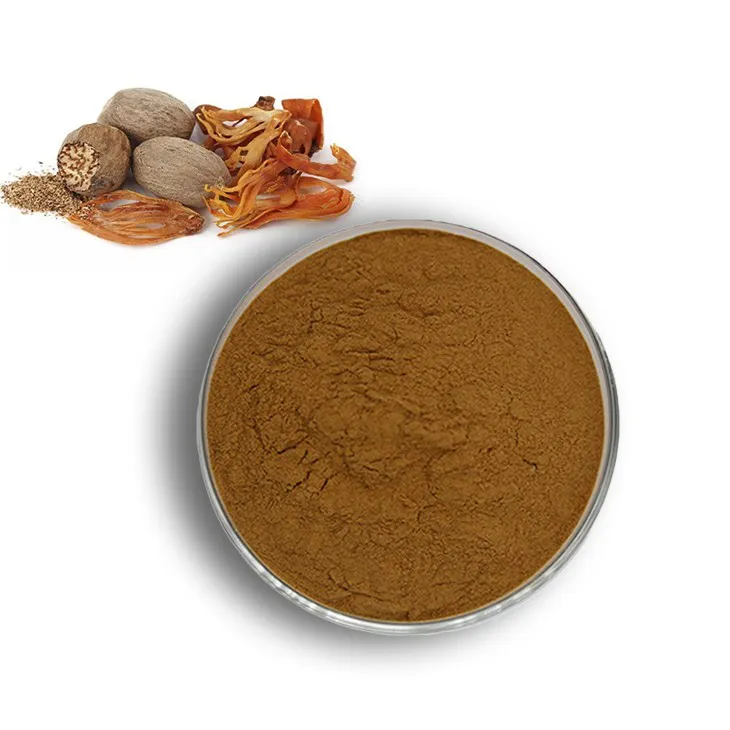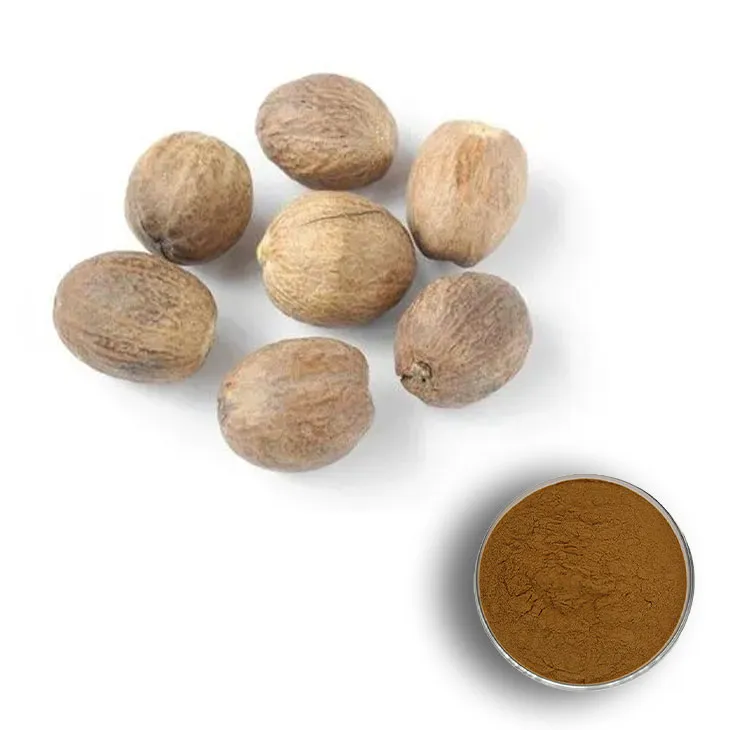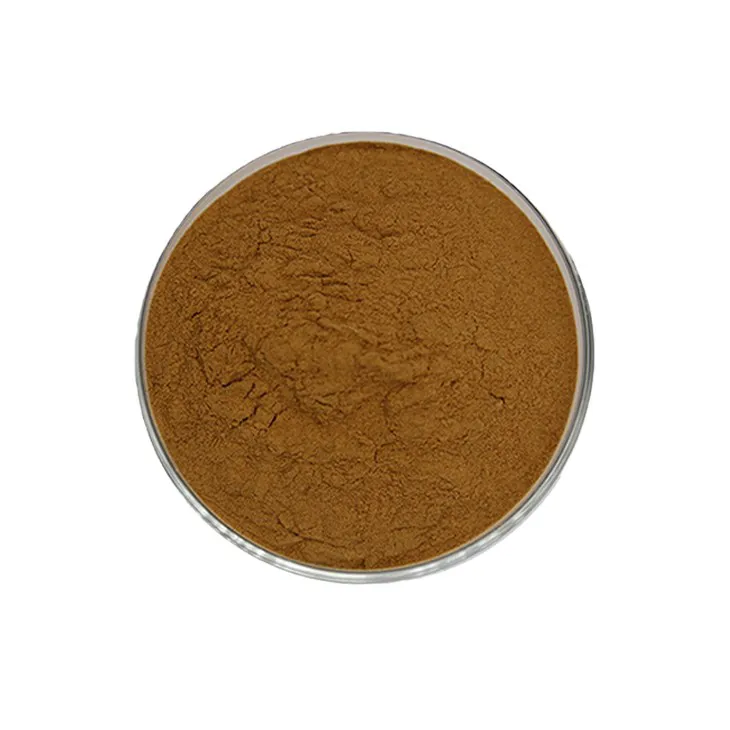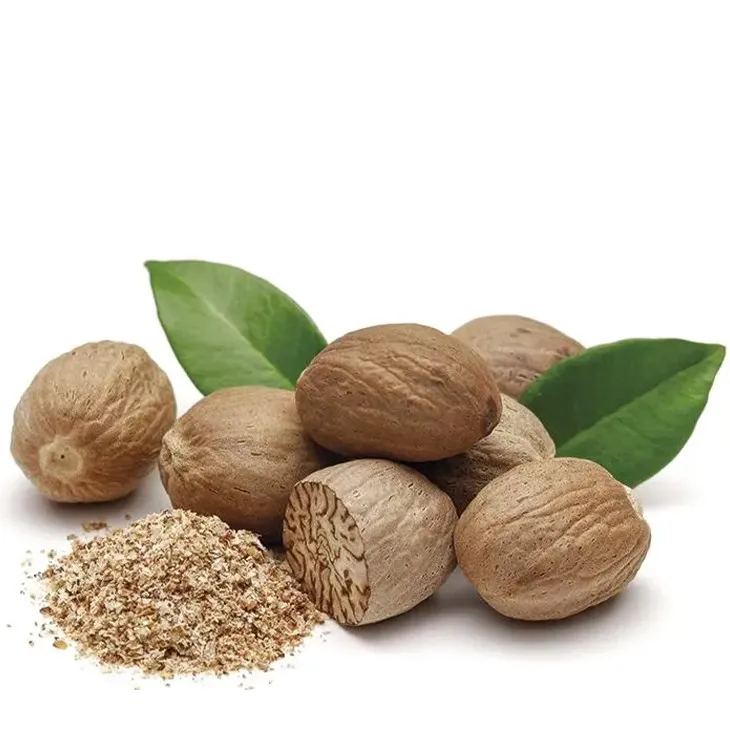- 0086-571-85302990
- sales@greenskybio.com
The extraction process of nutmeg extract.
2024-11-28

1. Introduction
Nutmeg, a valuable spice, has been used for centuries in various applications such as in cooking, traditional medicine, and as a component in dietary supplements. The extraction of Nutmeg Extract is a crucial process to obtain the beneficial components present in it. This article will delve into the detailed extraction process of Nutmeg Extract, starting from the raw material collection to the final product analysis.

2. Raw Material Collection
Fresh or Properly Stored Nutmeg: The extraction process of Nutmeg Extract begins with the collection of high - quality nutmeg. Nutmeg can be collected either fresh or after proper storage. Fresh nutmeg contains a higher amount of volatile oils and other bioactive compounds, which are important for the quality of the extract. However, proper storage of nutmeg is also crucial if fresh nutmeg is not immediately available for extraction. The storage conditions should be such that they prevent spoilage and degradation of the nutmeg's chemical constituents.

3. Pretreatment - Size Reduction
Increasing Surface Area for Better Extraction: After collection, size reduction is often a necessary step. This involves grinding or chopping the nutmeg into smaller particles. By reducing the size of the nutmeg, the surface area available for extraction is significantly increased. This is important because a larger surface area allows for more efficient contact between the nutmeg and the extraction solvent. For example, if the nutmeg is in large pieces, only the outer surface will be in contact with the solvent initially, and the extraction process will be slow. However, when it is ground into a fine powder, the solvent can penetrate more easily and extract the desired compounds more effectively.

4. Solvent Extraction
The Key Step in Obtaining Nutmeg Extract: Solvent extraction is a fundamental step in the extraction of nutmeg extract. Different solvents can be used to target different chemical constituents within the nutmeg.
4.1. Conventional Solvents
- Ethanol: Ethanol is a commonly used solvent for nutmeg extraction. It is effective in extracting a wide range of compounds, including phenolic compounds, terpenes, and flavonoids. Ethanol is a polar solvent, which means it can dissolve polar and some semi - polar compounds present in nutmeg. It has the advantage of being relatively safe, as it is widely used in the food and pharmaceutical industries. - Hexane: Hexane is a non - polar solvent that is mainly used for extracting non - polar compounds such as lipids and essential oils from nutmeg. However, hexane has some disadvantages, such as its potential toxicity and the need for careful handling and purification to ensure the safety of the final extract.
4.2. Supercritical CO2 Extraction
- An Environmentally Friendly Option: Supercritical CO2 extraction is also an option for nutmeg extraction. Supercritical CO2 has properties that make it an excellent solvent for this purpose. It is more environmentally friendly compared to some traditional solvents, as it is non - toxic, non - flammable, and leaves no solvent residue in the final extract. - Cleaner Extract Production: In addition to being environmentally friendly, supercritical CO2 extraction can produce a cleaner extract. It can selectively extract the desired compounds with high purity, which is important for applications in the food, pharmaceutical, and dietary supplement industries. For example, it can extract the essential oils from nutmeg without co - extracting unwanted impurities that may be present when using other solvents.

5. Concentration of the Extract
Achieving the Desired Concentration: After extraction, the extract obtained usually contains a large amount of solvent along with the desired nutmeg compounds. Concentration is required to increase the proportion of the active components in the extract.
5.1. Rotary Evaporation
- Rotary evaporation is a commonly used technique for concentrating the nutmeg extract. In this process, the extract is placed in a round - bottomed flask and heated gently while being rotated under reduced pressure. The solvent evaporates at a lower temperature due to the reduced pressure, and the vapor is condensed and collected separately. This allows for the removal of the solvent, leaving behind a more concentrated nutmeg extract.
6. Analysis of the Final Nutmeg Extract
Ensuring Quality and Composition: The final nutmeg extract needs to be analyzed for its chemical composition and quality. This is essential to ensure that it meets the requirements for use in various products such as dietary supplements, traditional medicines, and food flavorings.
6.1. Chemical Composition Analysis
- Chromatographic Techniques: Chromatographic techniques such as high - performance liquid chromatography (HPLC) and gas chromatography (GC) are often used to analyze the chemical composition of the nutmeg extract. HPLC is useful for analyzing polar and semi - polar compounds, while GC is more suitable for volatile compounds such as essential oils. These techniques can identify and quantify the various compounds present in the extract, such as myristicin, elemicin, and safrole, which are important bioactive components of nutmeg. - Spectroscopic Methods: Spectroscopic methods like infrared spectroscopy (IR) and ultraviolet - visible spectroscopy (UV - Vis) can also be used to analyze the functional groups present in the extract. IR spectroscopy can provide information about the types of chemical bonds in the compounds, while UV - Vis spectroscopy can be used to detect the presence of certain chromophores, which can give an indication of the presence of specific compounds.
6.2. Quality Control
- Purity and Contaminant Analysis: Quality control of the nutmeg extract involves checking for its purity and the presence of contaminants. Contaminants such as heavy metals, pesticides, and microbial contaminants can pose a risk to the safety and efficacy of the extract. Analytical methods such as atomic absorption spectroscopy for heavy metals and microbiological assays for microbial contaminants are used to ensure the safety of the extract. - Standardization: Standardization of the nutmeg extract is also important. This involves ensuring that the extract contains a consistent amount of the active ingredients. Standardization can be achieved by adjusting the extraction and concentration processes based on the results of the chemical composition analysis. For example, if the amount of a particular bioactive compound is found to be too low, the extraction conditions can be modified to increase its yield.
7. Conclusion
The extraction process of nutmeg extract involves multiple steps, from the collection of raw materials to the final analysis of the product. Each step plays a crucial role in obtaining a high - quality nutmeg extract that can be used in various applications. With the increasing demand for natural products in different industries, proper extraction and quality control of nutmeg extract will continue to be important to ensure its safety and efficacy.
FAQ:
What are the initial steps in the extraction process of nutmeg extract?
The process starts with the collection of fresh or properly stored nutmeg. Then, size reduction is carried out to enhance the surface area for more effective extraction.
Why is solvent extraction important in obtaining nutmeg extract?
Solvent extraction is crucial as different solvents can target different chemical constituents within the nutmeg, which helps in isolating the desired components for the extract.
What are the advantages of supercritical CO2 extraction in nutmeg extract production?
Supercritical CO2 extraction is more environmentally friendly and can produce a cleaner extract compared to some other extraction methods.
How is the nutmeg extract concentrated?
The extract can be concentrated through techniques like rotary evaporation.
Why is the analysis of the final nutmeg extract necessary?
The analysis of the final nutmeg extract is necessary to determine its chemical composition and quality. This ensures that it meets the requirements for use in various products such as dietary supplements, traditional medicines and food flavorings.
Related literature
- “Optimization of Nutmeg Extract Extraction for Medicinal Purposes”
- “The Role of Solvents in Nutmeg Extract Production”
- “Supercritical Fluid Extraction of Nutmeg: A Comprehensive Review”
- ▶ Hesperidin
- ▶ citrus bioflavonoids
- ▶ plant extract
- ▶ lycopene
- ▶ Diosmin
- ▶ Grape seed extract
- ▶ Sea buckthorn Juice Powder
- ▶ Beetroot powder
- ▶ Hops Extract
- ▶ Artichoke Extract
- ▶ Reishi mushroom extract
- ▶ Astaxanthin
- ▶ Green Tea Extract
- ▶ Curcumin Extract
- ▶ Horse Chestnut Extract
- ▶ Other Problems
- ▶ Boswellia Serrata Extract
- ▶ Resveratrol Extract
- ▶ Marigold Extract
- ▶ Grape Leaf Extract
- ▶ blog3
- ▶ Aminolevulinic acid
- ▶ Cranberry Extract
- ▶ Red Yeast Rice
- ▶ Red Wine Extract
-
Alisma Extract
2024-11-28
-
Yohimbine Bark Extract
2024-11-28
-
Tamarind extract powder
2024-11-28
-
Lavender Extract
2024-11-28
-
Aguaje Extract
2024-11-28
-
Genistein
2024-11-28
-
Motherwort Extract
2024-11-28
-
Oyster Mushroom Extract Powder
2024-11-28
-
Eyebright Extract
2024-11-28
-
Curcumin Extract
2024-11-28





















